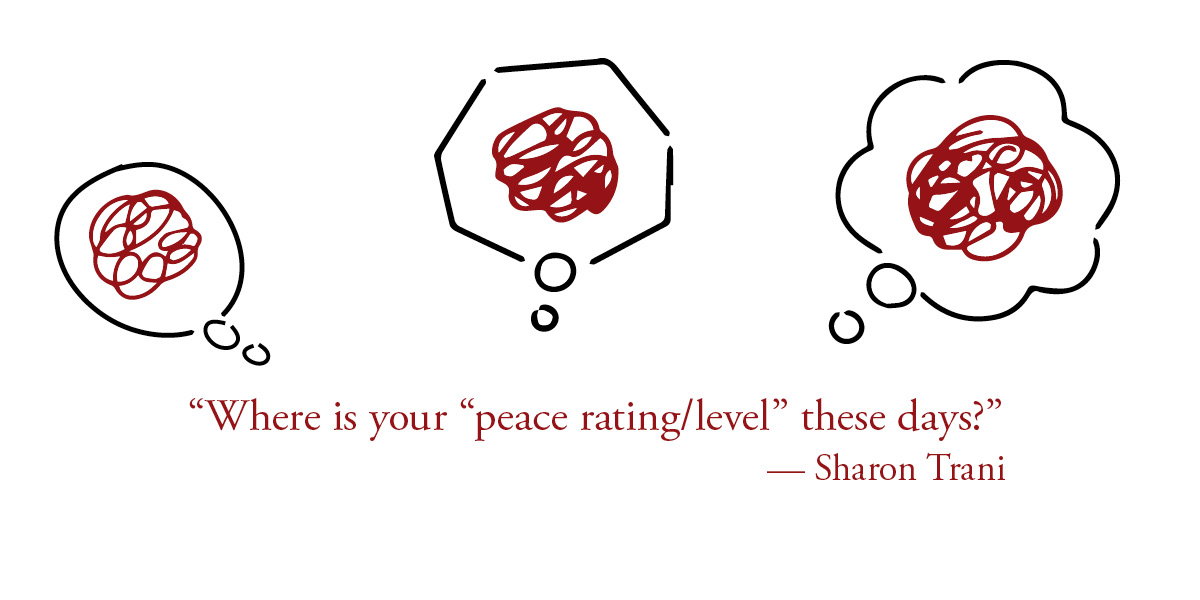
Uneasy and unsettled?
Our world can feel very unsettling. We are bombarded with negative messages of war, disease, impending natural catastrophes, broken families, and volatile political division. Our own personal lives may feel overwhelming. Our friends and even our Church can be disappointing. And more and more people are feeling isolated, alone. We can easily feel anxious and disturbed and lose any sense of peace.
Where is your “peace rating/level” these days? For some of you, this may have been an illusive or non-existing entity for most of your life. For others who have known peace, it comes and goes and perhaps feels mostly absent nowadays. I would like to suggest that peace is something we can all work toward. Most importantly, Jesus wants to give us peace “that passes all understanding” (Philippians 4:7). He came to calm our troubled hearts. He shows us how to be at rest.
First, we need to recognize that if we are basing our peace on circumstances and situations, we are most likely not going to find it. Peace is not the absence of conflict and trouble; it exists despite those. We can develop tranquility amid stress and chaos. Peace is a quiet stillness of our heart and mind, based on having a right relationship with God, one another (as much as possible), and oneself.
Several years ago, I met a married woman who presented with a high level of anxiety. We spent several visits developing tools to manage her anxiety, eventually prescribed a medication, but her anxiety continued to stay high. I again explored with her whether something in her life might be contributing to her angst; this time she shared that she was having an affair. She was struggling with an internal conflict and was making a choice in direct contradiction to what she knew to be honest and just and was shattering her relationship with herself as well as with God. Peace is difficult and even impossible while we choose to be dis-integrated. But when we make healthy choices for our emotional and spiritual self, then peace can flow in, even though life may continue to be challenging. When we work toward peace with God and ourselves, and in our families and communities, the unrest around us is much less likely to rock our boat.
How can we grow our peace? First, we need to take charge of what we are feeding our hearts and minds. Are we choosing to sit with God and know His love and care for us? Are we choosing to spend as much time listening to inspiring podcasts as we are to the news (which is 95 percent negative)? Research is increasingly and consistently showing a disturbing association between screen time and mental health. Screen time increases angst and anxiety, hyperarousal, and stress, because of the effect of blue light as well as the distorted material, loss of reality, negative spin, and just the overwhelming amount of information. There is very little material on Facebook etc. that makes us stronger, better people. If we insist on dumping stupid stuff into our heads, we can be sure to reap an uncomfortable unease.
Instead, keep a gratitude journal, list the good things in your life, reach out to others, have positive conversations. Build an awareness that God is in control, that He is working with us to combat evil. Work at healing and building relationships. Recognize what we can do for our broken world and families and what we must leave to God.
Cultivating peace in our lives yields immeasurable good, for our own physical, mental, and spiritual health and powerfully impacts our homes, children, and communities. May we become peaceable people, living and spreading peace.
To quote St. Teresa of Calcutta: “Peace begins with a smile.”
—Sharon Trani, a nurse practitioner, is a marriage and family therapist with Vermont Catholic Charities Inc.
—Originally published in the Spring 2024 issue of Vermont Catholic magazine.

